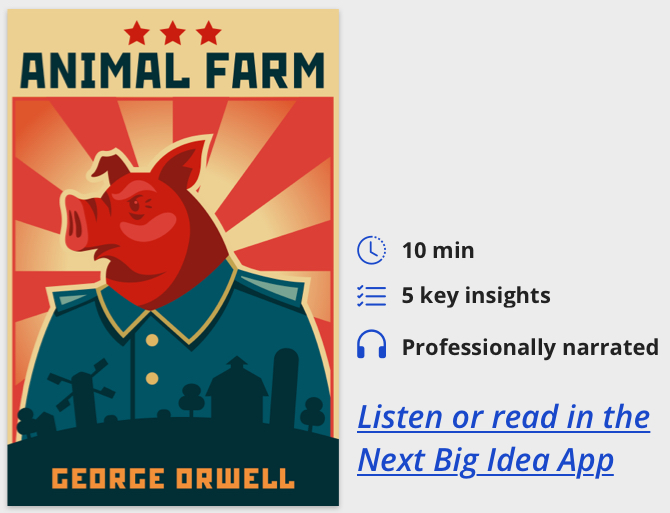Love the deeper insight to books I know and love and the exposure to books I have not experienced yet. Highly recommend to anyone who enjoys getting deeper insight into books.
Animal Farm
What is it about?
George Orwell, a lifelong democratic socialist, wrote Animal Farm while reflecting on his experiences fighting as a partisan in the Spanish Civil War. While Orwell intended Animal Farm to serve as a rebuke of Stalinism, the novella’s allegorical structure invites all kinds of readings. As a political parable, it details the history of the Bolshevik revolution. As a cautionary tale, it offers a blueprint for betrayed rebellions. And viewed through a business lens, it offers unforgettable insights about leadership, management, and the workings of dysfunctional organizations.
Bone-headed leaders. Badly run facilities. Under-appreciated workers. Ever-changing mission statements. It behooves any leader to heed the warnings of Animal Farm, lest they find themselves indistinguishable from the problems they once sought to solve.
Key idea 1 of 5
Listen to the first key insight
Hypocrisy inspires defeatism.
Napoleon, the Berkshire boar and dictator of Animal Farm, is Orwell’s symbol for Joseph Stalin. Rapacious, two-timing, greedy, cunning, tyrannical—he comes to embody, by the book’s end, all the worst human instincts that the revolution on Manor Farm sought to overcome. Napoleon, Squealer, and the other pigs are, in the truest sense of the word, hypocrites.
Every company has its hypocrites. Every employee has, at some point in their career, had to deal with a manager who typifies the expression, “Do as I say, not as I do.” When left unanswered, hypocrisy erodes trust in management. Employees are less productive, less likely to speak up or participate, and more likely to seek other opportunities.
Throughout Animal Farm, the pigs increasingly adopt the behaviors of their human predecessors, changing rules and conducting themselves in such a way that is forbidden to the other animals.
Having once declared the farmhouse off-limits, the pigs eventually take up residence in the former home of the overthrown tyrant, Mr. Jones. Squealer, symbolizing the propaganda arm of the Soviet bureaucracy, tirelessly convinces the animals that no such resolution ever existed, and that the farmhouse residence is necessary for the pigs, as they are “the brains of the farm.”
The sheep, Animal Farm’s mindless consumers of propaganda, constantly repeat the phrase “Four legs good, two legs bad.” The repetition serves to distinguish the animals from their former human overlords. At the end of the book, however, the pigs themselves have taken to walking upright on two legs. Once again, the leadership gaslights the animals, morphing the revolutionary maxim into, “Four legs good, two legs better.” The hypocrisy culminates in the uniquely Orwellian commandment, writ large over the barn: “All animals are equal, but some animals are more equal than others.”
This passage marks the fullest betrayal of the revolution, but it also underscores how institutional hypocrisy drains and demoralizes workers. Rather than combat the hypocrisy, workers are left feeling powerless.
Listen to the first key insight
Key ideas in this title
Hypocrisy inspires defeatism.
Bad managers find ways to justify greed.
An under-appreciated worker is an exploited worker.
Propaganda suppresses change.
Pride comes before the fall.
Hundreds of New Nonfiction & Classic Books Available

Read or listen

Ecourses & Podcast

Curated Book Lists
Join thousands of other life-long learners at the Next Big Idea Club


There are so many book summary apps out there and I love some of them, like Blinkist and Uptime. NBI is different. NBI's summaries, or Big Ideas, are written and narrated by the authors so you get the main points that the authors of the books want you to get. I also love listening to audios narrated by the authors themselves.
Book Summaries From Nonfiction Bestsellers in Minutes, by the Authors.

Start Your 2-Week Free Trial
Get access to hundreds of summaries of the newest non fiction as well as our growing "Classics" collection














